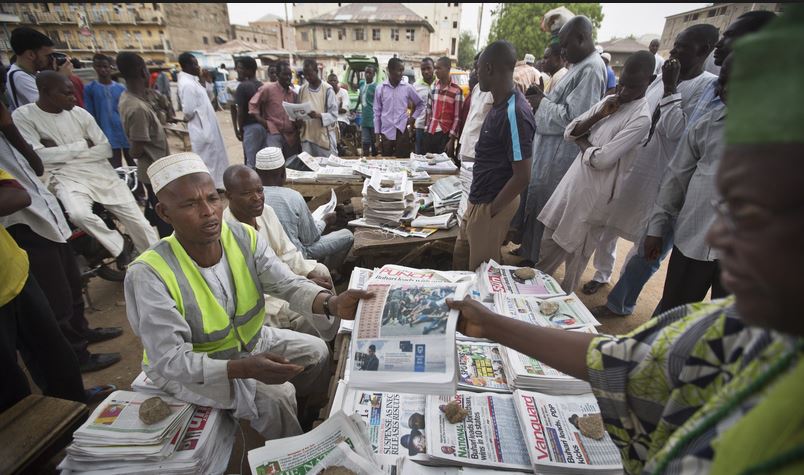The report that the Academic Staff Union of Universities (ASUU) has extended its ongoing strike action by another eight weeks dominates the headlines of Nigerian newspapers on Monday.
The Guardian reports that the Academic Staff Union of Universities (ASUU) has extended its ongoing strike action by another eight weeks.
The union had a month ago declared a 30 days strike action in the first instance in its face-off with the Federal Government.
The resolution to extend the strike action was reached after a meeting this weekend.
An ASUU official, Prof. Abdulkadir Muhammad Danbazau, who confirmed the report, said the decision to extend the strike was to allow the union and government reach agreement in other to avoid any other strike in future.
He added that the two months was enough for the government to do the right thing on the lingering issues.
The newspaper says that if the projection of the World Bank is anything to take seriously, Nigerian businesses may have lost nothing less than $232 billion (N96.4 trillion) in the last eight years that the Federal Government and operators in the power sector dilly-dally on making it perform.
While government ministers in charge of power, the Transmission Company of Nigeria (TCN) and Nigerian Bulk Electricity Trading Company (NBET) trade fresh blame with the Distribution Companies (DisCos) and the Generation Companies (GenCos), industries and homes across the country are hit by total darkness.
This is despite the continuous tariff increase designed under the Service Based Tariff (SBT), which the minister of finance, budget and national planning, Zainab Ahmed, admitted is being implemented.
Meanwhile, there are indications that the liquidity crisis, which has trapped the sector from fresh investment, has increased to about N3.7 trillion.
The situation in the electricity sector worsened of late, with the 11 distribution companies issuing notes to end-users blaming the TCN of not supplying enough energy to dispatch.
The TCN fired back on the GenCos, stating that 14 power generation plants were down across the country. NBET in a sharp twist blamed DisCos saying, “the DisCos have reneged on all performance agreements and held the sector in a fix.”
The Punch reports that the Federal Government is still in negotiations with the organised labour as regards the removal of subsidy on Premium Motor Spirit, popularly called petrol, it was gathered on Sunday.
Officials of the Nigerian National Petroleum Company Limited and the Nigerian Midstream and Downstream Petroleum Regulatory Authority stated that the removal of subsidy on petrol had been an explosive issue.
This, they said had made the government engage in negotiations with the organised labour on the matter despite the persistent rise in the amount being spent on subsidy amidst the recent increase in global crude oil prices.
Last week, The PUNCH exclusively reported that the World Bank projected that Nigeria would spend about N4tn on petrol subsidy in 2022, as oil marketers also stated that the amount could rise to N6tn going by the rise in the price of crude oil.
The NNPC being the sole importer of petrol into Nigeria for about four years has been shouldering the subsidy burden over the years, although it often describes this as under-recovery.
When asked on Sunday if the company would be able to sustain the mounting petrol subsidy cost, the spokesperson of NNPC, Garba-Deen Muhammad, told our correspondent that subsidy was now a policy issue.
The Nation says that the Nigerian Government at the weekend unveiled new security arrangement for the nation’s free trade zones in line with international best practice to guard investors and guarantee investors’ confidence in the special economic zone.
The government has also extended the validity period of the licences of operators in free trade zones from one to five years.
Minister of Industry, Trade and Investment, Otunba Niyi Adebayo, made these known during the inauguration of the new Nigeria Export Processing Zones Authority (NEPZA) Lagos Office and the unveiling of the Special Economic Zone Security Unit at the weekend in Lagos.
He said the country has realised over $20 billion in cumulative investments in 30 years of the free zone scheme.
According to him, last year, Nigeria generated N250 billion in foreign and local direct investments, N25 billion in customs duty payments, and N55 billion in local import backward linkages.
He added that Nigeria raked in N500 million in Pay-as-You Earn (PAYEE) taxes, even as the scheme created 25, 000 new jobs, and transferred skills for 5,000 employees.
The newspaper reports that the stock market is considering a major amendment to its rules to checkmate boardroom intrigues and block information arbitrage that tend to confer advantages on companies’ directors.
The new rules also expand the scope and authority of corporate financial reporting while eliminating gaps that allow companies to sidetrack relevant rules in stage-managing corporate compliance.
The draft of the extensive amendments obtained at the weekend seeks to provide clarity and greater disclosures on directors’ trading in shares, corporate liability for accuracy and compliance of financial statement, dissuade bogus dividend payment and other boardroom’s maneuverings that tend to favour insiders.
The proposed amendments come on the heels of increased violations of rules on ‘closed period’, when directors are banned from trading in the shares of their companies. Rule 17.17 of the Nigerian Exchange disallows insiders and their connected persons from trading in the shares or bonds of their companies during the ‘closed period’ or any period during which trading is restricted.
This period is mostly at a time of sensitive material information, like prior knowledge of financials, dividends or major corporate changes, which places directors and other insiders at advantage above other general and retail investors.
GIK/APA


